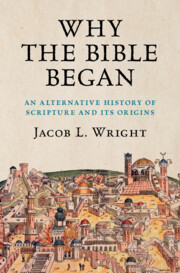Book contents
- Why the Bible Began
- Why the Bible Began
- Copyright page
- Dedication
- Contents
- Figures
- Maps
- Acknowledgments
- Prologue
- Introduction
- Part I The Rise and Fall
- Part II Admitting Defeat
- Part III A New Narrative
- 15 Jeremiah and Baruch
- 16 Isaac and Rebekah
- 17 Moses and Joshua
- 18 Hannah and Samuel
- 19 Solomon and the Queen of Sheba
- 20 Jonah and the Whale
- 21 Yhwh and His People
- Part IV A People of Protest
- Subject Index
- Scholars Cited
- Biblical References
- References
17 - Moses and Joshua
The People’s History
from Part III - A New Narrative
Published online by Cambridge University Press: 13 July 2023
- Why the Bible Began
- Why the Bible Began
- Copyright page
- Dedication
- Contents
- Figures
- Maps
- Acknowledgments
- Prologue
- Introduction
- Part I The Rise and Fall
- Part II Admitting Defeat
- Part III A New Narrative
- 15 Jeremiah and Baruch
- 16 Isaac and Rebekah
- 17 Moses and Joshua
- 18 Hannah and Samuel
- 19 Solomon and the Queen of Sheba
- 20 Jonah and the Whale
- 21 Yhwh and His People
- Part IV A People of Protest
- Subject Index
- Scholars Cited
- Biblical References
- References
Summary
One day, while tending the flocks of his father-in-law, Moses ventures “beyond the wilderness.” Looming over this liminal space is the sacred mountain Horeb (an alternative name for Sinai). It is here that Yhwh, in the not-too-distant future, will make a covenant with the Israelites after liberating them from bondage in Egypt. And it is here that Yhwh, on this fateful day, calls Moses from a burning bush and sends him to the pharaoh “so that you may bring my people, the children of Israel, out of Egypt.” This is the pivotal moment in myths when the hero learns of his mission. Yet instead of eagerly embracing his mission, Moses objects: “Who am I that I should go to the pharaoh and bring the children of Israel out of Egypt?” (Exodus 3:10–11).
- Type
- Chapter
- Information
- Why the Bible BeganAn Alternative History of Scripture and its Origins, pp. 270 - 285Publisher: Cambridge University PressPrint publication year: 2023



